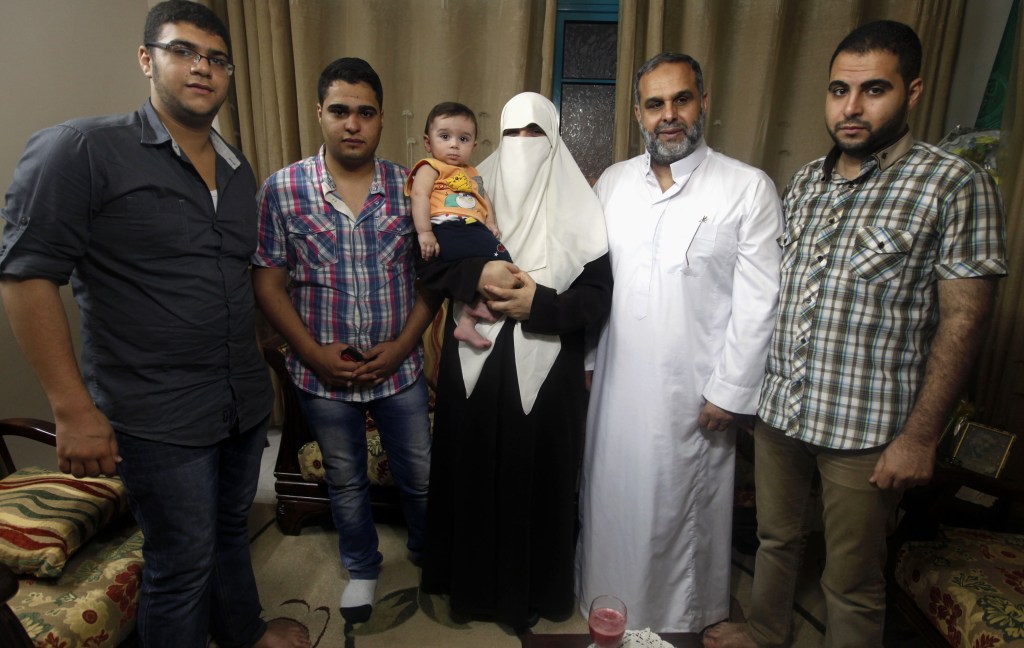GAZA CITY, Gaza Strip – On the day of his induction, Baraa Rantisi was told to wait near a mosque.
At the appointed time, a white car drove up. Baraa and the driver exchanged passwords – the name and nickname of an early Muslim leader – and Baraa got in.
Then a man in a sparsely furnished room instructed Baraa and two other recruits on the values of Islam. Baraa placed his hand on the Quran, the Muslim holy book, and swore “unwavering loyalty and obedience.”
With that oath 10 years ago, Baraa joined the Muslim Brotherhood, an exclusive movement that sees itself on a divine mission to establish Islamic rule.
The story of Baraa, 24, and his extended family shows how the Brotherhood’s cohesion and discipline have built it up into a successful movement that seized power in the Arab Spring. But some argue that the same closeness and authoritarian nature has worked against the Brotherhood, which now faces challenges in Egypt, Gaza and Tunisia.
“They fail to make the transition from a closed organization into an open and broad-based transparent government,” said Fawaz A. Gerges of the London School of Economics. “They behaved, while in government, exactly as they behave internally.”
Over several months, AP reporters had rare access to the Rantisis, a Brotherhood family that is perhaps the closest thing to a political dynasty in the movement in Gaza. Baraa’s father Mohammed, his mother Kifah and some of his siblings, uncles and cousins are Brotherhood members.
The movement forms the core of their lives.
It was the Brotherhood that selected devout Kifah from a wealthy family to marry Mohammed, now 55. It also gave him $2,000 to set up a clinic. In return, the orthopedic surgeon treated patients for free at a local mosque and paid 2.5 percent of his salary in monthly dues.
The Rantisis reflect the basic recruitment principles of the Brotherhood: Family and religion.
The neighborhood mosque serves as a base. From there, Brothers coach football, organize trips and tutor students for free while scrutinizing potential recruits, said Baraa’s uncle Nabhan, 58, a former recruitment chief.
Smokers and slackers are disqualified. The most dedicated mosque regulars are offered try-outs, where they must perform their five daily prayers at the mosque and discuss religious books assigned to them.
Baraa’s uncle Salah, 52, a gynecologist, is a supervisor in charge of about 500 Brothers, who decides how to spend the monthly membership dues.
Hamas, the Brotherhood branch that has ruled Gaza since 2007, is unique in the global movement because of its violent struggle against Israel, but it adheres to the organization’s principles.
As in Egypt, the Brothers in Gaza have built a network of clinics, kindergartens, schools and welfare programs. The Brotherhood extends from North America to Bangladesh. Brothers in Qatar, Turkey, Malaysia and other countries offer scholarships to Gaza students, such as Salah’s son Mohammed, who is studying medicine in Tunisia.
Despite its close-knit nature, the Brotherhood – along with the Rantisi household – is now split over direction, amid a crisis of power in Egypt and its spillover into Gaza.
Former president and Brotherhood leader Mohammad Morsi of Egypt was ousted in a July coup. Hamas, meanwhile, is losing millions because Egypt’s military has largely closed smuggling routes to Gaza.
For embattled Brothers, the biggest question is how tolerant they should be in power.
In Egypt, the backlash against the Brothers grew in response to their attempts to entrench Islamic rule. Gaza, a conservative Muslim society of 1.7 million, often goes along, but has pushed back at times.
In April, even some Hamas members protested when police rounded up more than two dozen young men who wore low-waist pants or gel-styled spiky hair, and shaved the heads of several.
Baraa criticized the head-shaving policemen on Facebook. His uncle Salah said police acted properly. And his mother came down somewhere in between: She opposed the police crackdown, but said personal choice has its limits. With her two grown daughters, the debate is not over whether to wear Western clothes, but over how loose or tailored their Islamic robes should be.
Hamas has cracked down hard on women. Few dare appear in public without a headscarf.There is some protest, even within the Brotherhood, where women have a separate organization and are mostly involved in social work rather than politics. Yet the Brothers consider themselves moderate, particularly when compared to Salafis, who preach an ultraconservative form of Islam.
Baraa embodies both the tradition and the modern pressures within the movement. The strict tone of the Rantisi household was set by Kifah, 47, one of the first Gaza women in the 1980s to veil her face. Kifah is the highest-ranking Rantisi in the movement, among just five women in Gaza’s 51-person Shura advisory council.
Baraa, stylish with Ray-Ban sunglasses, has challenged his mother’s contention that music is a gateway to sin.
“I had hot discussions with her,” said Baraa, who writes poems and downloads opera and rap from YouTube. But he also embraces the Brotherhood way.
Send questions/comments to the editors.



Success. Please wait for the page to reload. If the page does not reload within 5 seconds, please refresh the page.
Enter your email and password to access comments.
Hi, to comment on stories you must . This profile is in addition to your subscription and website login.
Already have a commenting profile? .
Invalid username/password.
Please check your email to confirm and complete your registration.
Only subscribers are eligible to post comments. Please subscribe or login first for digital access. Here’s why.
Use the form below to reset your password. When you've submitted your account email, we will send an email with a reset code.